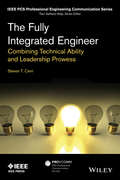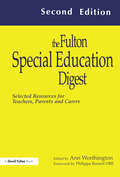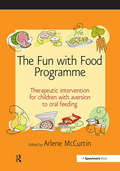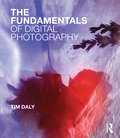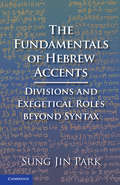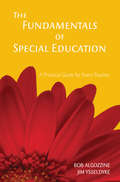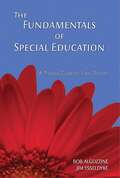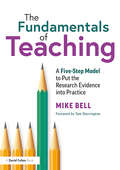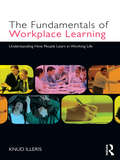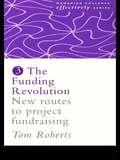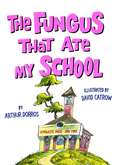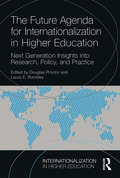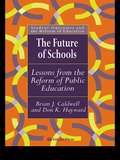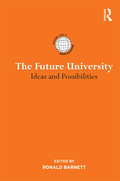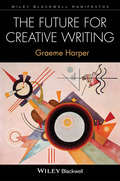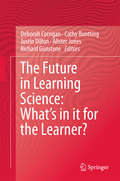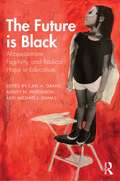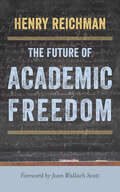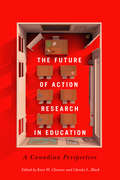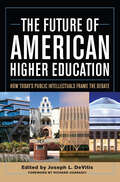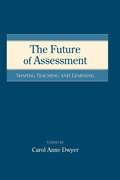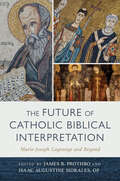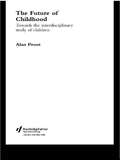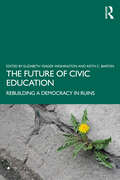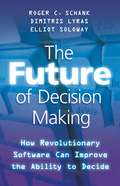- Table View
- List View
The Fully Integrated Engineer
by Steven T. CerriCollege teaches you to be a good engineer. But it's likely that your college engineering courses didn't have time to teach you how to effectively contribute your ideas or how to transition to management or leadership. This book provides you with those missing tools. Identify patterns of behavior that don't serve you (or your organization) well and change them Create a plan of action that will allow for personal change that will impact your professional work Hone the ways that your technical work can be seen positively inside your organization Promote the talents and skills of the team players around you Become a flexible, supportive, and positive asset
The Fulton Special Education Digest: Selected Resources for Teachers, Parents and Carers
by Ann WorthingtonThis fully updated second edition is an essential reference book that contains a wealth of resources and practical information relating to the education and care of children with special educational needs. Within its pages you will find an accessible, jargon-free overview of current SEN policies and how they affect parents, teachers and children; contact details of over 1,000 selected organizations, charities and services that exist to help the child with special educational needs; an extensive glossary of terms and medical conditions associated with special education; pointers to useful resources on the Internet; the names and addresses of Local Education Authorities, all of which can provide information on inclusive schooling; the names and addresses of over 1,800 special schools in the UK; and advice on how to make links with other professionals, to ensure all children with special educational needs are getting the attention to which they are entitled. Any teacher, teaching assistant, parent or carer of a child or children with special educational needs will find this book a useful companion.
The Fun with Food Programme: Therapeutic Intervention for Children with Aversion to Oral Feeding
by Arlene McCurtinContributors: Arlene McCurtin, Damhnait Ni Mhurchu, Petro van deventer, Marie Kennedy, Ger McGuirk, Trish Morrison, Jeni Malone
The Fundamentals of Digital Photography (Fundamentals Ser.)
by Tim DalyThe Fundamentals of Digital Photography explores the guiding principles of great photography through efficient and effective technique. Easy-to-follow instructions teach you how to work with a digital workflow and develop a solid understanding of materials and processes. You will also find creative inspiration through the work of some of the world’s great historical photographers, and discover how the history of photography can feed into your own work. Themed projects, featuring stunning images from contemporary international practitioners, will help you focus your ideas to produce truly original photographs.The assignments at the end of each chapter help you to create a body of work that will expand your photographic portfolio. By shooting these carefully devised assignments, you will become a confident software user, and develop the all-important visual and conceptual skills essential to successful photography.
The Fundamentals of Hebrew Accents: Divisions and Exegetical Roles beyond Syntax
by Sung Jin ParkThis book is designed to serve as a textbook for intermediate Hebrew students and above. Sung Jin Park presents the fundamental features of the Tiberian Hebrew accents, focusing on their divisions and exegetical roles. Providing innovative methods for diagramming biblical texts, the volume explores the two major rules (hierarchy and dichotomy) of disjunctive accents. Students will also attain biblical insights from the exegetical application of the biblical texts that Hebrew syntax alone does not provide. Park's volume shows how the new perspectives on Hebrew accents enhance our understanding of biblical texts.
The Fundamentals of Special Education: A Practical Guide for Every Teacher
by Bob Algozzine Dr James E. YsseldykeThis guide highlights major concepts in special education—from disability categories, identification issues, and IEPs to appropriate learning environments and the roles general and special educators play.
The Fundamentals of Special Education: A Practical Guide for Every Teacher (Practical Approach To Special Education For Every Teacher Ser.)
by Bob Algozzine Jim YsseldykeThe busy educator's concise guide to the essentials of special education!In The Fundamentals of Special Education, authors Bob Algozzine and Jim Ysseldyke highlight the major concepts in special education, providing readers with a better understanding of the field, from disability categories and statistics to appropriate learning environments.Including a pretest, posttest, and key vocabulary terms, this practical guide answers the many questions educators have about special education, including: What is "special education" exactly, and why do we have it? How many students receive special education services and who are they? How are students identified for special education services? Where are students with disabilities taught? What is an Individualized Education Plan (IEP)? What roles do general and special education teachers play in addressing the needs of students with disabilities, and how do their responsibilities overlap? How does diversity influence special education? What about students who are gifted and/or talented?This excellent resource outlines a practicable approach to special education in all its many forms so that teachers can be prepared for the challenges they might face in the classroom.
The Fundamentals of Teaching: A Five-Step Model to Put the Research Evidence into Practice
by Mike BellTeachers are bombarded with advice about how to teach. The Fundamentals of Teaching cuts through the confusion by synthesising the key findings from education research and neuroscience to give an authoritative guide. It reveals how learning happens, which methods work best and how to improve any students’ learning. Using a tried-and-tested, Five-Step model for applying the methods effectively in the classroom, Mike Bell shows how you can improve learning and eliminate time-consuming, low-effect practices that increase stress and workload. He includes case studies from teachers working across different subjects and age groups which model practical strategies for: Prior Knowledge Presenting new material Setting challenging tasks Feedback and improvement Repetition and consolidation. This powerful resource is highly recommended for all teachers, school leaders and trainee teachers who want to benefit from the most effective methods in their classrooms.
The Fundamentals of Workplace Learning: Understanding How People Learn in Working Life
by Knud IllerisFundamentals of Workplace Learning is a comprehensive guide to how people learn in the workplace, and the issues and challenges involved. Examining the essential aspects of workplace learning and unravelling the various influences which affect the success of work-based learners, Knud Illeris presents a holistic model to explain how diverse individuals can be encouraged and invited to learn at work. Approaching workplace learning from the perspective of learners as human beings, with complex social and psychological needs, as opposed to resources to be managed, this book examines in detail the key issues surrounding workplace learning, including: The workplace environment as a learning space Workplace learning as competence development A multitude of different kinds of workplace learning arrangements Job-transcending learning initiatives The interaction between formal and informal learning environments The challenges presented by specific groups: early school leavers, elderly workers and the new young generation. Presenting conclusions on workplace learning and possibilities for the future this book focuses on a way forward while detailing the fundamentals of successful workplace learning. It will appeal to everyone involved in understanding and improving learning in the workplace including educationalists, business students, managers, personnel and educational leaders.
The Funding Revolution: New Routes to Project Fundraising
by Tom Roberts Mr Tom Roberts*****Nfa*****At a time when traditional funding is diminishing and costs increasing, the need to look to new external sources of money is now central to survival for many organizations. New avenues of funding often demand a new outlook, and old ways of thinking can prove to be barriers to success. This book looks not only at methods for raising funds, providing practical steps in preparing for new funding initiatives, but also at the attitudes and mind-sets that form part of the whole picture. The volume is concise and accessible, with plans of action, bullet lists and diagrams for ease of consultation.
The Fungus That Ate My School
by Arthur DorrosWhile the students are home for spring vacation, the fungus they are growing in their classroom grows and grows and takes over the entire school.
The Future Agenda for Internationalization in Higher Education: Next Generation Insights into Research, Policy, and Practice (Internationalization in Higher Education Series)
by Laura E. Rumbley Douglas ProctorThe internationalization of higher education is a world-wide phenomenon, subject to multiple interpretations at national, institutional and individual levels. Still, much of the mainstream literature on this topic is concentrated on a small number of countries and a narrow range of key topics. To address this gap, The Future Agenda for Internationalization in Higher Education offers a broader set of perspectives from outside the dominant English-speaking and Western European paradigms, while simultaneously focusing on dimensions of internationalization that are known to be under-researched. Additionally, the editors give primacy to next generation perspectives, not only to amplify our current understanding of key issues around the world, but also to shine a light on possible future agendas for this important aspect of contemporary higher education. The notions of new modes, new topics, and new contexts frame the analysis, providing new pathways for exploring and understanding distinct aspects of this crucially important phenomenon in higher education around the world. Key topics covered include: the current state of research and analysis on the internationalization of higher education aspects of internationalization and international activities which have not previously been explored or have limited current exposure how research into internationalization is conducted, showcasing innovative methodological practices a synthesis of common themes and differences in relation to the future agenda of topics, modes and contexts for internationalization an identification of key areas for future research A thoughtful guide for considering the many possible directions ahead for internationalization in higher education, The Future Agenda for Internationalization in Higher Education is essential reading for academic researchers and graduate students, as well as international education practitioners and leaders keen to make sense of evolving trends in this field.
The Future Of Schools: Lessons From The Reform Of Public Education (Student Outcomes And The Reform Of Education Ser.)
by Brian J. Caldwell Don HaywardThis text provides an analysis of the efforts to establish systems of self-managing schools around the world. The core of this book is the description of the transformation of the education system in the state of Victoria, Australia, from dependence in a highly centralized and bureaucratized structure to one that values local decision making and the creation of a system of self-managing schools. The text goes on to show how these and similar programmes in other nations could lay the foundations for similar reform. The authors propose that there must be changes in the role of key stakeholders, including government, community and profession; traditional approaches must be challenged and new ways to fund schools to be canvassed.
The Future University: Ideas and Possibilities (International Studies in Higher Education)
by Ronald BarnettWinner of the Comparative and International Education Society Higher Education Special Interest Group Best Book Award for 2014! As universities increasingly engage with the world beyond the classroom and the campus, those who work within higher education are left to examine how the university’s mission has changed. Official reviews and debates often forget to inquire into the purposes and responsibilities of universities, and how they are changing. Where these matters are addressed, they are rarely pursued in depth, and rarely go beyond current circumstances. Those who care about the university’s role in society are left looking for a renewed sense of purpose regarding its goals and aspirations. The Future University explores new avenues opening up to universities and tackles fundamental issues facing their development. Contributors with interdisciplinary and international perspectives imagine ways to frame the university’s future. They consider the history of the university, its current status as an active player in local governments, cultures, and markets, and where these trajectories may lead. What does it mean to be a university in the twenty-first century? What could the university become? What limitations do they face, and what opportunities might lie ahead? This volume in the International Studies in Higher Education series offers bold and imaginative possibilities.
The Future for Creative Writing (Wiley-Blackwell Manifestos)
by Graeme HarperThis is a compelling look at the current state and future direction of creative writing by a preeminent scholar in the field. Explores the practice of creative writing, its place in the world, and its impact on individuals and communities Considers the process of creative writing as an art form and as a mode of communication Examines how new technology, notably the internet and cell phones, is changing the ways in which creative work is undertaken and produced Addresses such topics as writing as a cultural production, the education of a creative writer, the changing nature of communication, and different attitudes to empowerment
The Future in Learning Science: What's in it for the Learner?
by Alister Jones Cathy Buntting Deborah Corrigan Justin Dillon Richard GunstoneThis volume considers the future of science learning - what is being learned and how it is being learned - in formal and informal contexts for science education. To do this, the book explores major contemporary shifts in the forms of science that could or should be learned in the next 20 years, what forms of learning of that science should occur, and how that learning happens, including from the perspective of learners. In particular, this volume addresses shifts in the forms of science that are researched and taught post-school - emerging sciences, new sciences that are new integrations, "futures science", and increases in the complexity and multidisciplinarity of science, including a multidisciplinarity that embraces ways of knowing beyond science. A central aspect of this in terms of the future of learning science is the urgent need to engage students, including their non-cognitive, affective dimensions, both for an educated citizenry and for a productive response to the ubiquitous concerns about future demand for science-based professionals. Another central issue is the actual impact of ICT on science learning and teaching, including shifts in how students use mobile technology to learn science.
The Future is Black: Afropessimism, Fugitivity, and Radical Hope in Education
by Carl A. Grant Michael J. Dumas Ashley N. WoodsonThe Future is Black presents Afropessimism as an opportunity to think in provocative and disruptive ways about race, racial equality, multiculturalism, and the pursuit of educational justice. The vision is not a coherent, delimited conversation, but a series of experiences with Afropessimism as a radical analytic situated within critical Black studies. Activists, educators, caregivers, kin, and all those who love Black children are invited to make sense of the contemporary Black condition, including a theorization of Black suffering, Black fugitivity, and Black futurity. These three concepts provide the foundation for the book's inquiry, and contribute to the examination of Black educational opportunity, experience, and outcomes. The book not only explores how schooling becomes complicit in, and serves as, a site of Black material and psychic suffering, but also examines the possibilities of education as a site of fugitivity, of hope, of escape, and as a space within which to imagine an emancipation yet to be realized.
The Future of Academic Freedom (Critical University Studies)
by Henry ReichmanFew issues are as hotly debated or misunderstood as academic freedom. Reichman's book sheds light on and brings clarity to those debates.Winner of the Eli M. Oboler Memorial Award by the American Library AssociationAcademic freedom—crucial to the health of American higher education—is threatened on many fronts. In The Future of Academic Freedom, a leading scholar equips us to defend academic freedom by illuminating its meaning, the challenges it faces, and its relation to freedom of expression.In the wake of the 2016 election, challenges to academic freedom have intensified, higher education has become a target of attacks by conservatives, and issues of free speech on campus have grown increasingly controversial. In this book, Henry Reichman cuts through much of the rhetoric to issue a clarion call on behalf of academic freedom as it has been defined and defended by the American Association of University Professors (AAUP) for over a hundred years. Along the way, he makes it clear that this is the issue of our day.Over the course of ten audacious essays, Reichman explores the theory, history, and contemporary practice of academic freedom. He pays attention to such varied concerns as the meddling of politicians and corporate trustees in curriculum and university governance, the role of online education, the impact of social media, the rights of student protesters and outside speakers, the relationship between collective bargaining and academic freedom, and the influence on research and teaching of ideologically motivated donors. Significantly, he debunks myths about the strength of the alleged opposition to free expression posed by student activism and shows that the expressive rights of students must be defended as part of academic freedom.Based on broad reading in such diverse fields as educational theory, law, history, and political science, as well as on the AAUP's own investigative reporting, The Future of Academic Freedom combines theoretical sweep with the practical experience of its author, a leader and activist in the AAUP who is an expert on campus free speech. The issues Reichman considers—which are the subjects of daily conversation on college and university campuses nationwide as well as in the media—will fascinate general readers, students, and scholars alike.
The Future of Action Research in Education: A Canadian Perspective
by Kurt W. Clausen And Glenda L. BlackWhile the action research community across Canada is a vibrant one, it remains scattered, dismissed as rootless and still unproven. This book illuminates action research as a vital and long-established Canadian perspective, taking stock of its use in education by a wide array of scholars and practitioners. Reflecting an inclusive range of viewpoints from twenty-two scholars across the nation, chapters show without question that action research - encompassing collaborative, iterative, and practice-based research - is a growing field in Canada. Authors bring a range of experiences that speak to the many facets of this movement. They discuss historical foundations, individual and large-scale projects dealing with a multitude of subject areas and educational practices, and participatory methods that speak to the discipline's capacity to engage with the pressing social issues of our time. A timely intervention that threads the field together and serves as both a reference and a guide to further work, The Future of Action Research in Education draws clear links between the past and future and maps bold new directions for this approach.
The Future of American Higher Education: How Today's Public Intellectuals Frame the Debate
by Joseph L. DeVitis"This impressive anthology presents the reader with an introduction to a gallery of public intellectuals through the critical eyes of a wide array of contributing writers from various academic fields. Both the latter and the public intellectuals themselves are responding to the state of American higher education. Importantly, most of them (there are a few public intellectuals in the book who cling closer to the status quo) do not separate colleges and universities from the political, economic, and social currents of American society. They attack the realities of growing social inequality, the intractable presence of institutional racism, and the recurrent reliance on the free market as the arbiter of value. Public intellectuals assess the impact of these social factors on the organization and practices of contemporary American higher education. They force the reader to consider serious challenges to the current arrangement of higher learning and, as such, they ask us to assess the efficacy of their respective perspectives. Do they present the reader with insight or idealism, pathways or dead ends? This compendium provides an abundance of ideas for higher education leaders, policy makers, faculty members, trustees and governmental officials as well as social theorists and graduate students interested in higher education careers."—Richard Guarasci, President Emeritus of Wagner CollegeJust as our society is polarized, higher education is no less divided as to its mission and purpose, whether it should be preparing students for employment or for engagement as citizens, whether it should be corporatist and profit-driven or promote intellectual curiosity and independent thinking, and whether it should pursue a neoliberal agenda or promote a liberal education. Whose scholarship, culture and epistemologies should be validated? Should it be a private or a public good? Preserve tenure or erode it? What role should colleges and universities play in addressing economic inequality and systemic racism? The answers to these questions are critical for the future of our society as our universities and colleges are the nurseries of the values and philosophies that shape it.The chapters in this book review the contributions of seventeen public intellectuals who have been at the forefront of these issues and significantly contributed to these debates. Each describes the genesis of each scholar’s ideas and presents and critiques his or her core insights and arguments. The seventeen public intellectuals represent a spectrum of opinion, from the conservative to the progressive.At this pivotal moment when much of higher education is in economic crisis, and public trust in it has been eroded, this book offers a robust entry point for considering the options and directions ahead for anyone in a leadership position. The book will also be valuable for higher education courses to stimulate debate about these critical issues and introduce readers to the seminal thinkers in the field.Public Intellectuals PresentedStanley AronowitzMichael BérubéMarc BousquetPatricia Hill CollinsLori Patton DavisWilliam DeresiewiczStanley Fish Marybeth GasmanHenry GirouxSara Goldrick-RabbAmy GutmannRussell JacobyRandall KennedyDavid KirpDavid F. LabareeChristopher NewfieldMichael Roth
The Future of Assessment: Shaping Teaching and Learning
by Carol Anne Dwyer@text:This volume stems from the 2003 Educational Testing Service Invitational Conference that convened leading scholars and practitioners from education, psychology, economics, statistics and public policy to discuss the important topic of measurement and accountability. The chapters cover all significant aspects of the current accountability scene, with careful but not exclusive attention to the No Child Left Behind act. Written by nationally recognized scholars with a mandate to write in a non-technical style, this volume will appeal to anyone seriously interested in school reform and the educational accountability movement.
The Future of Catholic Biblical Interpretation: Marie-Joseph Lagrange and Beyond
by Edited by James B. Prothro and Isaac Augustine Morales OPNotable Catholic interpreters of Scripture discern the guiding values of biblical interpretation at the brink of a new era for the church. Under the influence of Benedict XVI and Francis, Roman Catholics, whether lay or religious, have found renewed interest in studying sacred Scripture. Yet the church has also grown and faces new challenges in the new millennium. What does the future of Catholic biblical interpretation look like? And how ought the church&’s rich heritage of biblical interpretation continue to influence it? This volume collects essays by some of the most influential voices in Catholic biblical scholarship today. Covering a variety of topics, from the Old Testament to the New Testament and biblical theology, the essays are united by a common goal: to hear the word of God and proclaim and apply it within the church. The authors pay special tribute to Marie-Joseph Lagrange. This nineteenth-century French Dominican led the way in blending critical methodology with respect for the Church&’s authority in order to put scriptural study in service to the good of souls. Featuring diverse and authentically Catholic perspectives, The Future of Catholic Biblical Interpretation represents fresh purpose and direction for the church&’s long and fruitful tradition of exegesis.
The Future of Childhood
by Alan ProutIn this ground-breaking book, Alan Prout discusses the place of children and childhood in modern society. He critically examines 'the new social studies of childhood', reconsidering some of its key assumptions and positions and arguing that childhood is heterogeneous and complex. The study of childhood requires a broad set of intellectual resources and an interdisciplinary approach. Chapters include: the changing social and cultural character of contemporary childhood and the weakening boundary between adulthood and childhood a look back at the emergence of childhood studies in the nineteenth and twentieth centuries the nature/culture dichotomy the role of material artefacts and technologies in the construction of contemporary childhood. This book is essential reading for students and academics in the field of childhood studies, sociology and education.
The Future of Civic Education: Rebuilding a Democracy in Ruins
by Keith C. Barton Elizabeth Yeager WashingtonSpeaking to the need to move beyond traditional formulations, this textbook presents radical visions for transforming civic education in the United States.Drawing on the experience of educators and scholars—including those rooted in feminist, queer, abolitionist, global, and race-conscious perspectives—this work offers new, practical ideas for civic education reform. Responding to recent political crises, many scholars, educators, and public commentators have called for a rebirth of civic education, but these all are grounded in the premise that the goal of civic education should be to teach students about the U.S. Constitutional system and how to operate within it. This book argues that the U.S. governmental system, including the Constitution, is infused with racist and anti-democratic premises and procedures. It asks: How can we seek a new path—one that is more democratic, more equitable, and more humane? A diverse range of leading civic educators, who are willing not just to push the boundaries of civic education but to operate outside its assumptions altogether, explore what future possibilities for civic education might look like and how these innovative ideas could be implemented in the classroom.Combining theory with practice, The Future of Civic Education will be important reading for those studying or researching in social studies methods, social studies issues, citizenship, and civic education. It will also be beneficial to social studies teachers at elementary and secondary levels, as well as policymakers and non-governmental organizations (NGOs).
The Future of Decision Making
by Roger C. Schank Dimitris Lyras Elliot SolowayWe now possess the capability to make great business decisions in even the most difficult situations with the use of today's advanced software capability. The authors, who are experts in the field, explain the new science of decision-making and offer examples and advice that will enable readers put it to use in their organizations.
